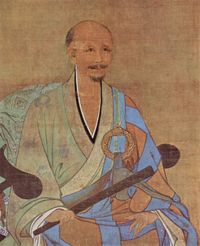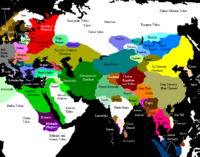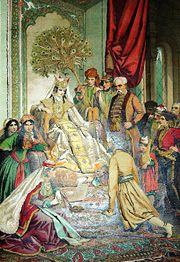13th century
2008/9 Schools Wikipedia Selection. Related subjects: General history
| Millennium: | 2nd millennium |
|---|---|
| Centuries: | 12th century · 13th century · 14th century |
| Decades: | 1200s 1210s 1220s 1230s 1240s 1250s 1260s 1270s 1280s 1290s |
| Categories: | Births – Deaths Establishments – Disestablishments |
As a means of recording the passage of time, the 13th century was that century which lasted from 1201 through 1300 in accordance with the Julian calendar in the Christian Era. . In the history of European culture, this period is considered part of the High Middle Ages, and after its conquests in Asia the Mongol Empire stretched from Korea to Eastern Europe.
Events

The Mongols, under the leadership of Genghis Khan, overran most of Asia, thus creating the second largest empire to ever exist, surpassed only by the British Empire. They achieved this success in large part due to their amazing horse archers.
- 1204 — Fourth Crusade sacks Byzantine Constantinople and creates the Latin Empire.
- 1205 — Battle of Adrianople (1205): Tsar Kaloyan with his army crushed the (otherwise unbeaten) Fourth Crusade's knights and the soldiers of Emperor Baldwin I of Constantinople who was attacking Bulgarian lands with the goal to conquer them.
- 1206 — Mongols united under Temüjin, who is proclaimed " one Khan".
- 1212 — The Battle of Las Navas de Tolosa in Iberia sees the beginning of a rapid Christian reconquest of the southern half of the Iberian peninsula, with the defeat of Moorish forces.
- 1215 — King John of England forced to sign Magna Carta at Runnymede.
- 1222 — Andrew II of Hungary signs the Golden Bull which affirms the privileges of Hungarian nobility.
- 1227 — Genghis Khan dies during the prolonged siege of the Western Xia Dynasty capital (located in northwestern China), while the Tangut Western Xia Dynasty falls soon after.
- 1234 — the Jin Dynasty of northeastern China is conquered by the forces of the Mongol ruler Ögedei Khan.
- 1238 — The Thai Kingdom of Sukhothai is established, with Theravada Buddhism as the state religion. Later in the century it vassalises significant parts of modern Thailand, Laos, Burma, and Malaysia.
- 1249 — End of the Portuguese Reconquista against the Moors, when King Afonso III of Portugal reconquers the Algarve.
- 1250- 1275 — the Arab or Persian born Muslim Pu Shougeng was appointed by the Song Dynasty Chinese government as the Commissioner of Merchant Shipping for Quanzhou.
- 1258 — Baghdad (Iraq), seat of the Muslim Abbasid dynasty, is besieged and burnt to the ground by the forces of the Mongol commander Hulagu Khan. The last Abbasid ruler Al-Musta'sim is executed by means of trampling horses.
- 1259 — the Mongol ruler Möngke Khan is killed in battle by a Chinese cannon blast at Fishing Town, Chongqing, located in southwestern China.
- 1260 — the Mongols are defeated by the Egyptian Mamluks in the Battle of Ain Jalut.
- 1270 — Restoration of Solomonic dynasty in Ethiopia, deposing the Zagwe dynasty.

Portrait of the Chinese Zen Buddhist Wuzhun Shifan, painted in 1238 AD, Song Dynasty.
- 1279, the Battle of Yamen marks the fall of the Chinese Song Dynasty and the rise of the Mongol Yuan Dynasty led by Khublai Khan.
- 1282 — Aragon acquires Sicily, after the Sicilian Vespers.
- 1284 — Peterhouse, Cambridge founded by Hugo de Balsham, the Bishop of Ely.
- 1291 — The Swiss Confederation is formed by Uri, Schwyz, and Unterwalden.
- Bantu-speaking peoples arrive in modern Angola, partially displacing the original Khoisan inhabitants.
- Battle of Bouvines
- Persian historian Rashid al-Din records eleven Buddhist texts circulating in Arabic translation.
- James I of Aragon takes control of Balearic Islands and Valencia.
- Marco Polo and his family reach China.
- Norway cedes the Isle of Man to Scotland, following the signing of the Treaty of Perth.
- Ögedei Khan establishes a Mongolian dynasty in China. Some Mongol leaders convert from Tantric Buddhism to Islam.
- Teutonic Knights begin activity in Eastern Europe.
- Theravada overtakes Mahayana as the dominant form of Buddhism in Cambodia.
- A period of civil unrest, . Sturlungaöld, leads to Iceland becoming part of the Kingdom of Norway.
- End of Hohenstaufen dynasty at the Battle of Tagliacozzo. The Kingdom of Sicily goes to French Anjou house.
- Fall of the Ghana Empire.
- Fall of the Hohenstaufen dynasty of Holy Roman Emperors. Sicily and Naples are acquired by the French count Charles I of Naples.
- Fifth through eighth crusades of western European kingdoms against Islam.
- Finland gets its first city, Turku.
- First European universities founded.
- Most of Asia and Eastern Europe is conquered and incorporated into the Mongol Empire.
- The Medieval Warm Period ends.
- The Utiguri Bulgar state on the Volga vanishes from history.
- Samoa gains its independence from the Tu'i Tonga Empire, and founds the Malietoa dynasty.
Significant people
- Queen Tamara, ruler of Georgia
- Lasha Giorgi, King Giorgi IV of Georgia
- Queen Rusudan, Queen Regnant of Georgia
- Saint Thomas Aquinas
Inventions, discoveries, introductions
- List of 13th century inventions
- The motet form originates out of the Ars antiqua tradition of Western European music.
- Manuscript culture develops out of this time period in cities in Europe, which denotes a shift from monasteries to cities for books.
- Pecia system of copying books develops in Italian university-towns and was taken up by the University of Paris in the middle of the century.
- Wooden movable type printing invented by the Chinese governmental minister Wang Zhen (official) in 1298.
- The earliest known rockets, landmines, and handguns are made by the Chinese for use in warfare.
- The Chinese adopt the windmill from the Islamic world.
Decades and years
|
|||||||||||||||||||||||||||||||||||||||||||||||||||||||||||||||||||||||||||||||||||||||||||||||||||||||||||||||||||||||||||||||||||||||||
|
|||||||||||||||||||||||||||||||||||||||||||||||||||||||||||||||||||||||||||||||||||||||||||||||||||||||||||||||||||||

